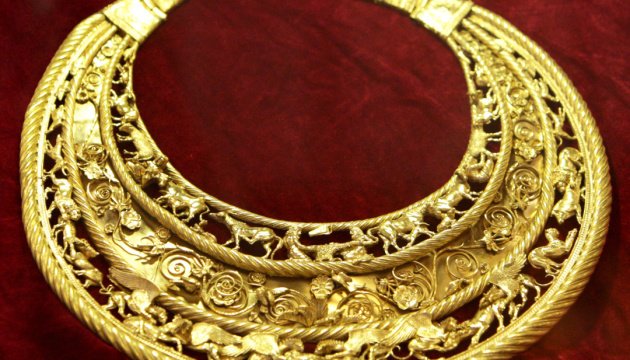The Amsterdam Court of Appeal granted Ukraine’s motion to disqualify a judge in the Scythian gold case due to confirmation of the presiding judge’s link with the lawyers of Crimean museums which could indicate his bias.
As an Ukrinform correspondent reports, the court announced the ruling in writing, without public hearings, today.
“This is a very important victory for us. The ruling will allow the case to be considered by an independent judge and will ensure the adversarial principle in the appellate proceedings. I want to praise the professional and excellent work of our Dutch colleagues. We count on impartial proceedings,” lawyer Andriy Karnaukhov, a partner of the Serhiy Kozyakov and Partners law firm, said in a comment to an Ukrinform correspondent in The Hague.
On 2 September 2020, the Amsterdam Court of Appeal began a hearing on the disqualification of a judge in the case of the Scythian gold museum collection. During the hearing, one of the three judges felt ill and the hearing was adjourned. After the break, the presiding judge noted that everything that happened on September 2 before the incident was taken into account.
Ukraine requests to disqualify a judge as additional facts, which could indicate the judge’s bias and link with Russia, were revealed.
Earlier, 1 November 2019, a court in The Hague rejected the motion of the Ukrainian side to disqualify a judge of the Amsterdam Court of Appeal who was considering the Scythian gold case. The ruling said that the court did not see any circumstances that would indicate the judge’s bias.
The proceedings were, in fact, adjourned pending the ruling on disqualification.
Later, Ukraine filed a second motion to disqualify the judge.
The Ministry of Justice of Ukraine revealed the circumstances that could indicate the bias of the presiding judge. In particular, according to the Ministry of Justice, the presiding judge of the Amsterdam Court of Appeal for several years had represented the interests of the Russian company Promneftstroy in the case against OJSC Yukos Oil Company, i.e. actually defended the interests of the Russian Federation in the case in favor of Promneftstroy. The judge represented Promneftstroy in close cooperation with lawyers representing Crimean museums in the Scythian gold case.
As reported, the collection of Scythian gold had been delivered to the Allard Pearson Museum in Amsterdam as part of the exhibition entitled “Crimea – the Gold and Secrets of the Black Sea” prior to the illegal annexation of Crimea by the Russian Federation.
On 14 December 2016, the Amsterdam District Court ruled that the exhibits of the Crimean museums had to be returned to Ukraine. The judgment was delivered pursuant to the UNESCO convention, according to which the art treasures should be returned to a sovereign state, which provided them for a temporary exhibition.
On 28 March 2017, the Amsterdam Court of Appeal received an appeal against the ruling from the representatives of Crimean museums.
On 11 March 2019, the Amsterdam Court of Appeal started to consider an appeal in the case of the return of the Scythian gold collection to Ukraine.
In July 2019, the Amsterdam Court of Appeal postponed the delivery of a final judgment in the Scythian gold case.
Currently, the Scythian gold collection is kept in the Allard Pearson Museum in Amsterdam.
ukrinform







